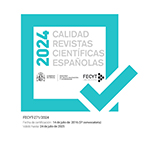Pluralismo religioso y políticas públicas locales: el caso del islam bangladesí en Madrid
Abstract
En el actual contexto global de pluralismo religioso, el reconocimiento social e institucional de los grupos religiosos depende, por una parte, de los marcos normativos y de la voluntad política de los representantes públicos y de sus gestores; y, por otra, de las estrategias de institucionalización que adopten los grupos religiosos, como su visibilización en el espacio público o la participación ciudadana en la vida política del municipio. El análisis de estas relaciones y de su incidencia en la sociedad, permite, analizar la emergencia de nuevos modelos de gobernanza de lo religioso en el ámbito local. Este artículo pretende, a partir del estudio de caso de la comunidad musulmana bangladesí de Madrid en el barrio de Lavapiés, analizar la gestión del Ayuntamiento de Madrid de la diversidad religiosa de la ciudad entre 2015 y 2019, coincidiendo con la alcaldía de Manuela Carmena y la candidatura ciudadana de Ahora Madrid.
Downloads
##submission.format##
Licenza
La revista 'Ilu. Revista de Ciencias de las Religiones, para fomentar el intercambio global del conocimiento, facilita el acceso sin restricciones a sus contenidos desde el momento de su publicación en la presente edición electrónica, y por eso es una revista de acceso abierto. Los originales publicados en esta revista son propiedad de la Universidad Complutense de Madrid y es obligatorio citar su procedencia en cualquier reproducción total o parcial. Todos los contenidos se distribuyen bajo una licencia de uso y distribución Creative Commons Reconocimiento 4.0 (CC BY 4.0). Esta circunstancia ha de hacerse constar expresamente de esta forma cuando sea necesario. Puede consultar la versión informativa y el texto legal de la licencia.











